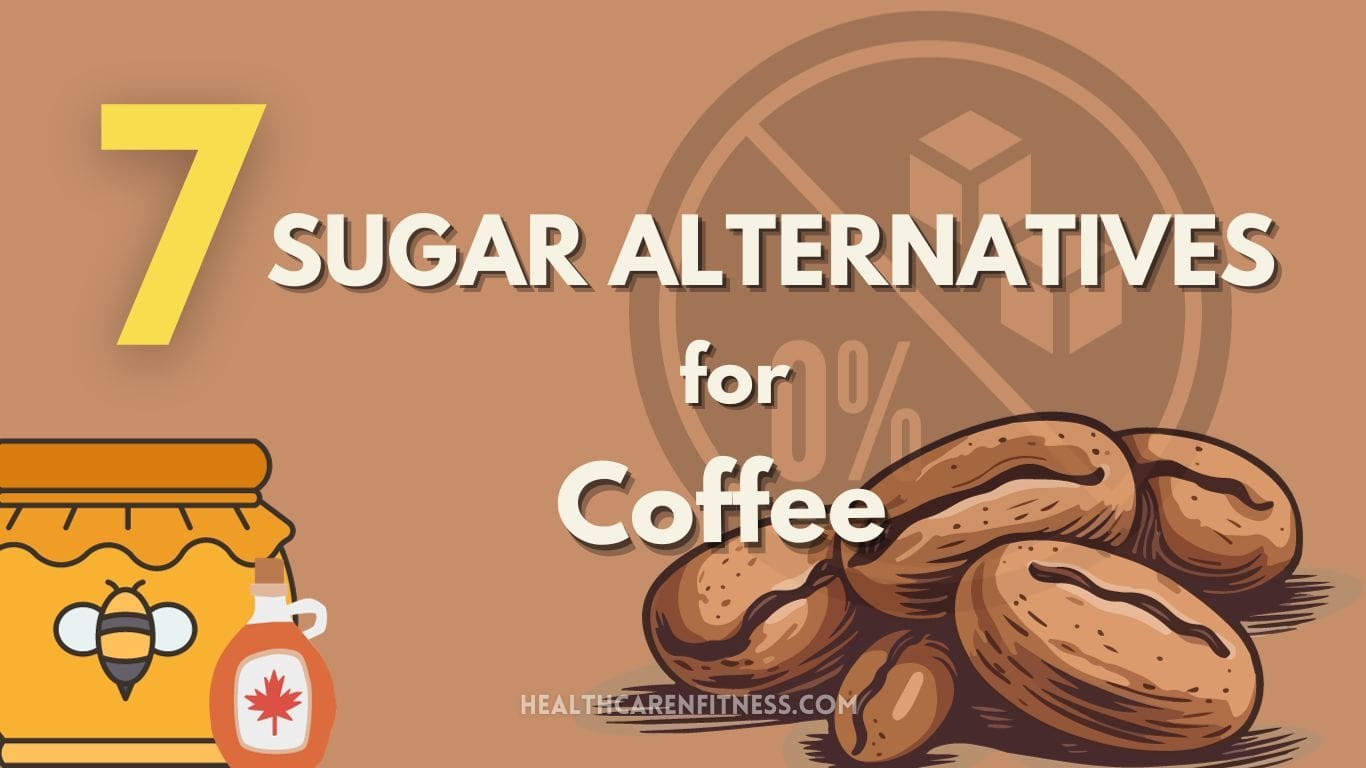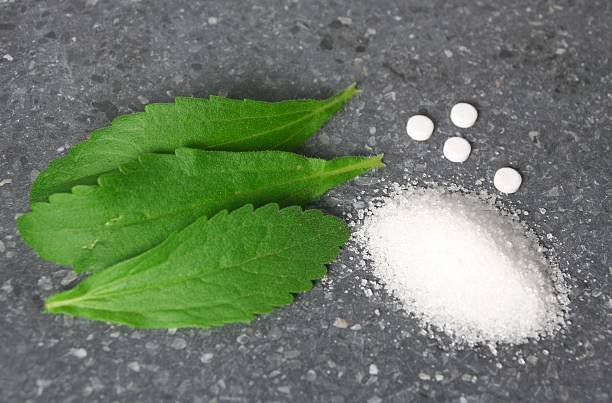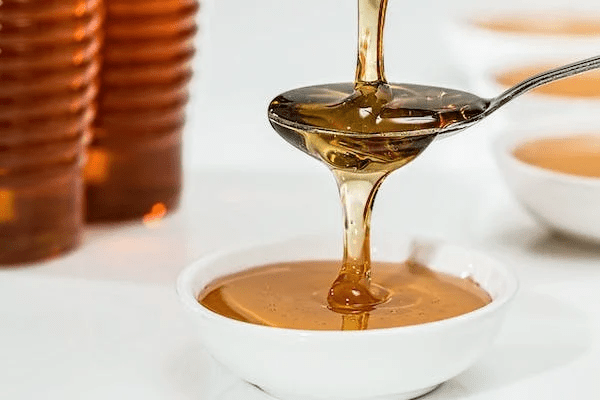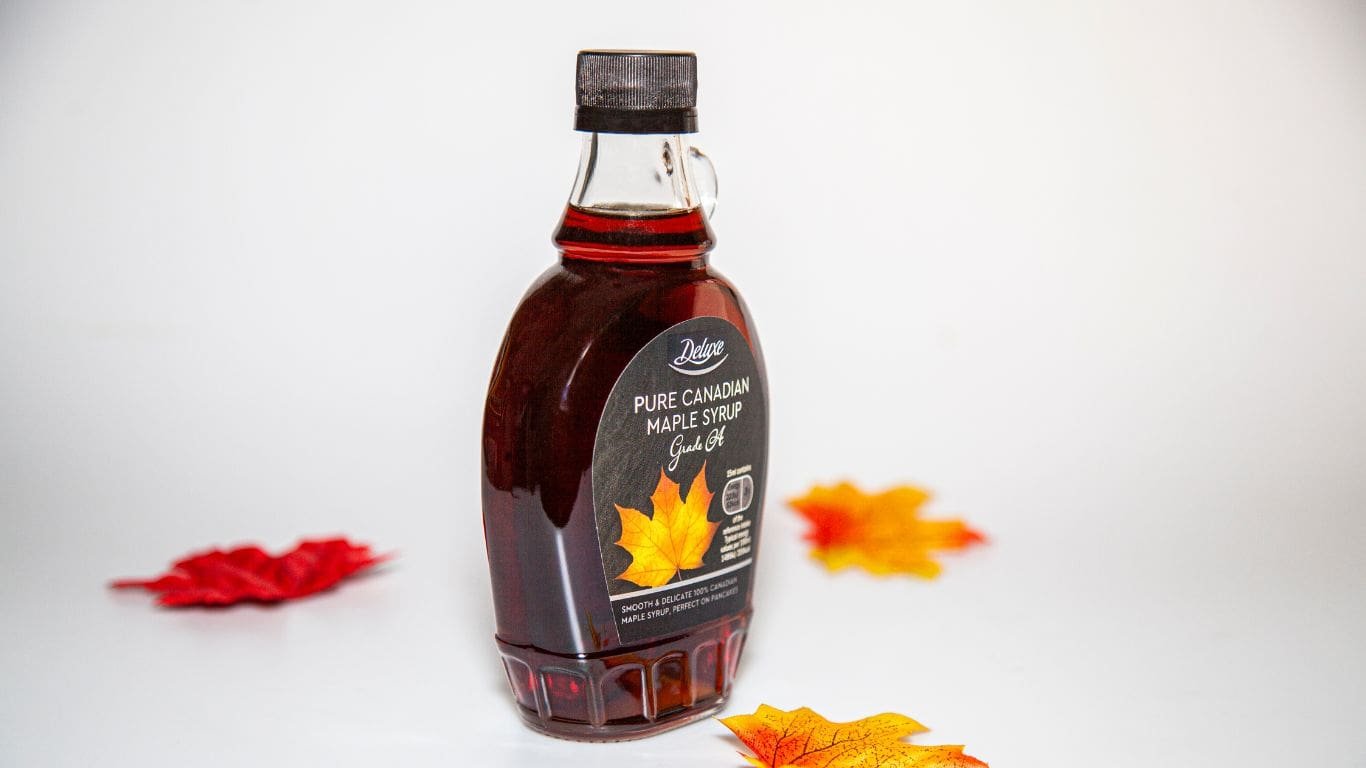
Introduction
In today’s fast-paced world, coffee is a beloved ritual. However, sugar, a common companion to coffee, is under scrutiny for its health effects. Excess sugar intake can lead to weight gain, increased risk of diabetes and cardiovascular problems. The resulting energy crash can interfere with daily activities, creating a cycle of dependency that affects overall well-being. To address these issues, people are looking for sugar alternatives for coffee that offer a tasty yet health-conscious coffee experience. This trend reflects a broader shift towards conscious consumption. The goal is to achieve a delicate balance, satisfying taste buds while prioritizing health in the pursuit of the perfect cup.
Best 7 Sugar Alternatives for Coffee
1. Stevia

Stevia is a natural sweetener made from the leaves of the Stevia plant. This is a game changer in the search of Sugar Alternatives for Coffee. Stevia’s pleasant sweetness isn’t the only reason for its popularity. It has numerous benefits that make it guilt-free.
Benefits of Stevia:
- Zero Calories: Its lack of calories, makes it an ideal choice for those watching their calorie intake.
- Diabetic-Friendly: Stevia does not spike blood sugar levels, making it a safe option for individuals with diabetes or those who are managing their blood sugar.
- Natural Origin: Extracted from the leaves of the Stevia plant, it is a naturally occurring sweetener, free from artificial additives.
- Intense Sweetness: Stevia is calorie-free, also is several times sweeter than traditional sugar, which allows smaller quantities to achieve the desired sweetness.
- Non-Cariogenic: Stevia doesn’t contribute to tooth decay, offering a sweet solution without compromising dental health.
- Antioxidant Properties: Some studies suggest that Stevia may have antioxidant properties, potentially contributing to overall health and well-being.
- Weight Management Support: As a zero-calorie sweetener, Stevia can be a valuable ally in weight management by providing sweetness without the added calories.
2. Honey

Honey is a natural and nutritious Sugar alternatives for coffee. It has a pleasant taste and provides many benefits, making it a favorite addition to your daily brew. Honey is a versatile ingredient that can be used in a variety of recipes, from sweetening hot drinks like coffee or tea to being an ingredient in baked goods.
Benefits of Honey:
- Antioxidant properties: Honey is loaded with antioxidants, which help fight oxidative stress and contribute to overall health.
- Boost Immune System: Its antimicrobial and antibacterial properties support a strong immune system, acting as a natural defense against illnesses.
- Throat Soothing Effect: Honey’s soothing effect on the throat can ease coughs and sore throats, making your coffee ritual even more enjoyable.
- Sustained Energy Source: The natural sugars in honey, primarily fructose and glucose, provide a quick and sustained energy boost without the rapid blood sugar spikes associated with refined sugar.
- Nutrient-Rich Enhancement: Honey is a source of essential nutrients, including vitamins, minerals and enzymes, which add nutritional value to your coffee.
- Gut Health Promoter: The prebiotic properties of honey promote the growth of beneficial bacteria in the gut, contributing to a healthy digestive system.
- Anti-Inflammatory Agent: Anti-inflammatory compounds in honey can help reduce inflammation throughout the body, potentially providing relief from a variety of health problems.
3. Agave Nectar

Agave nectar is a sweetener derived from the agave plant, which is low-glycemic alternative to traditional sweeteners. Agave nectar’s unique composition offers sweetness without the rapid spikes in blood sugar. This makes it a desirable choice for those looking to enhance the sweetness of their foods and beverages without introducing extra calories into their diet.
Benefits of Agave Nectar:
- Low-Glycemic Index: Agave nectar has a lower glycemic index than regular sugar, making it a better choice for those managing blood sugar levels.
- Suitable for Diabetics: Due to its minimal impact on blood sugar, agave nectar can be a suitable sweetener for people with diabetes when used in moderation.
- Natural Sweetness: Derived from the agave plant, agave nectar provides a natural sweetness without the need for artificial additives.
- Culinary Versatility: Agave nectar’s liquid form makes it easy to incorporate into various recipes and beverages, expanding its culinary versatility.
- Distinct Flavor Profile: The nectar possesses a mild, caramel-like flavor that can enhance the taste of both hot and cold beverages, adding a unique touch to your culinary creations.
4. Coconut sugar

Coconut sugar, also known as coconut palm sugar, is a natural sweetener made from the sap of the coconut palm tree. It’s minimally processed and plant-based, making it a popular choice for those looking for a natural sweetener.
Benefits of Coconut Sugar:
- Sustainability: Coconut sugar is obtained from the sap extracted from coconut palm trees, a process that does not harm the trees. This makes it an environmentally friendly and sustainable alternative to some other sweeteners.
- Low glycemic index: Coconut sugar has a low glycemic index compared to refined sugar, indicating a milder effect on blood sugar levels. This makes it a perfect choice for individuals monitoring their glucose intake and also a good choice in terms of sugar alternatives for coffee.
- Nutrient Richness: While processing removes nutrients from refined sugar, coconut sugar retains essential minerals like iron, zinc and potassium, adding nutritional value to your choice of sweetener.
- Distinctive flavor profile: Coconut sugar imparts a unique, caramel-like flavor that adds depth and richness to beverages and baked goods. It gives a subtle tropical sweetness without overpowering the taste.
- Vitamin content: Coconut sugar contains small amounts of vitamins, including B vitamins such as B1, B2, B3 and B6, which add extra nutrients to your diet.
- No artificial ingredients: As a natural sweetener, coconut sugar is free from artificial ingredients or preservatives. It’s a clean and unprocessed alternative for those looking for a more natural sweet solution.
5. Maple syrup

Maple syrup is a one of the natural sweetener which is made from sap of sugar maple trees. It’s common among all the sugar alternatives for coffee, and is rich in minerals such as iron, calcium, zinc, potassium. However, as it is still high in calories and sugar, it should be consumed in moderation.
Benefits of Maple syrup:
- Antioxidant powerhouse: Maple syrup is loaded with antioxidants that fight oxidative stress, promoting overall well-being.
- Nutrient-Rich: It is a treasure trove of essential minerals like manganese, zinc and calcium, which provide nutritional value beyond sweetness.
- Anti-inflammatory properties: The polyphenols in maple syrup boast anti-inflammatory properties, which help reduce inflammation throughout the body.
- Heart-Friendly: Research suggests that compounds in maple syrup may provide cardiovascular benefits, promoting heart health.
- Natural Energy Source: With a lower glycemic index than refined sugars, maple syrup provides a more sustained energy release, avoiding the spikes and crashes associated with refined sugars.
- Vitamin-Packed Delight: Maple syrup is a source of vitamins like riboflavin, niacin and B5, which contribute to a well-rounded nutritional profile.
6. Date Syrup

Date syrup is a natural sweetener made from date palm juice. It is a delicious and nutritious alternative to traditional sweets. Date syrup gives your coffee a rich, caramel-like sweetness and comes with a host of health benefits that make it an attractive choice for conscious consumers.
Benefits of Date syrup:
- Nutrient-Rich: Date syrup is a nutrient powerhouse, packed with essential vitamins and minerals including potassium, magnesium and vitamin B6, providing a natural dose of nutrients essential for overall health.
- Natural Antioxidants: Date syrup contains antioxidants that act as the body’s natural defense against free radicals, contributing to overall well-being and supporting a healthy immune system.
- Dietary Fiber: A good source of dietary fiber, date syrup aids digestion, promotes a healthy gut microbiome, and helps regulate blood sugar levels.
- Low glycemic index: Compared to refined sugar, date syrup has a low glycemic index, which leads to a slow and steady rise in blood sugar, making it a favorable choice for those who are conscious of their glucose levels.
- Sustainable Sweetening Choice: Made from date palm juice, date syrup is a sustainable sweetener option that aligns with eco-conscious options while supporting eco-friendly food practices.
- Iron-rich content: Date syrup provides a natural source of iron, supports energy production and fights the risk of iron-deficiency anemia. Including date syrup in your diet can provide you with numerous health benefits.
7. Artificial Sweeteners

Artificial sweeteners have become synonymous with sugar-free living, providing a guilt-free way to satisfy your sweet tooth. As sugar substitutes, they play an important role in a variety of diets, especially for those monitoring their calorie intake or managing conditions such as diabetes. Artificial sweeteners come in a variety of forms, each with a unique composition, taste, and use. However, everything has its pros and cons, and while choosing a healthy sugar alternatives for coffee, it’s essential to consider which artificial sweetener are you using.
Types of Artificial Sweeteners:
- Aspartame:
- Popular among diet sodas and sugar-free desserts.
- Known for its sweetness without adding calories.
- Controversial due to debates surrounding its safety.
- Sucralose:
- Also known as Splenda, widely used in beverages and baked goods.
- Heat-stable property, makes it suitable for cooking and baking.
- Does not impact blood sugar levels.
- Saccharin:
- One of the oldest artificial sweeteners.
- Used in diet products and sugar-free gum.
- Intensely sweet but may have a bitter aftertaste.
Balancing taste and health: Finding the right sugar substitute
Finding the perfect and healthy sugar alternatives for coffee is a delicate balance between satisfying your taste buds and prioritizing your health. With the variety of options available, each boasting distinct flavors and health benefits, this spectrum needs to be intelligently navigated to find the right sweetener for you.
Understanding Individual Preferences:
- Sweetness Level: Choose an option based on your preferred level of sweetness. Some sweeteners, such as stevia, provide intense sweetness, while others, such as agave nectar, provide mild sweetness.
- Flavor Profile: Experiment with the flavor profile of different sweeteners. For example, honey brings a unique floral sweetness, while coconut sugar brings a caramel-like richness to your recipes.
Considering Health Factors:
- Calorie Conscious?: Choose non-caloric sweeteners like stevia or artificial sweeteners to keep your calories in check.
- Blood sugar concerns?: Choose alternatives with a lower glycemic index, such as coconut sugar or erythritol, to reduce blood sugar spikes.
- A nutritional boost?: Consider sweeteners like maple syrup or date syrup, which provide additional nutrients and contribute to a more balanced nutritional profile.
FAQ’s
Are sugar alternatives for coffee safe for diabetics?
Individuals with diabetes should consult their healthcare provider before introducing sugar substitutes into their diet, as these sweeteners can have varying effects on blood sugar levels.
How much artificial sweetener can I consume daily?
The amount of artificial sweetener you can safely consume daily (ADI) varies depending on your weight and the type of sweetener used. In general, artificial sweeteners are safe for healthy people, including pregnant women, when used in limited amounts. It is always best to consult a healthcare professional before adding artificial sweeteners to your diet.
Are sugar alternatives for coffee safe for pregnant women?
Artificial sweeteners and natural sweeteners are generally safe for pregnant women in moderation, but consult your healthcare provider first.
Can I use sugar alternatives in baking?
Yes, many sugar alternatives can be used for baking. Experiment with options like stevia, erythritol, or coconut sugar as substitutes in your favorite recipes.
Do sugar alternatives for coffee taste the same as sugar?
Sugar substitutes offer a variety of flavors designed to mimic the sweetness of sugar without the calories. Experiment to find what suits your taste buds.
Conclusion
The search for the perfect healthy sugar alternatives for coffee is a journey of taste and health. From natural alternatives like stevia and honey to innovative artificial alternatives, the choices are endless. As you begin your search, consider your taste preferences, health goals, and the benefits of each sweetener. Remember, this is a personal process and the ideal sweetener awaits your discovery. So, raise your cup for future tasty sips, where taste and health meet. Let your coffee journey be as unique as your choice of sweetener. Cheers to the perfect cup!
